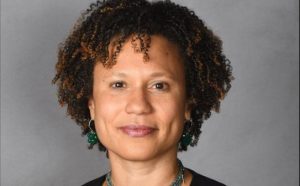“What, if anything, do you think is different in this moment?” asked Professor Catherine Powell to kick off a discussion on the global reach of anti-racism protests and their interplay with the coronavirus pandemic.

The June 10th virtual event, “Black Lives Matter: Protest, Police Violence, and the Pandemic,” was hosted by Fordham Law School’s Leitner Center for International Law and Justice. Powell spoke with Gay McDougall, a distinguished scholar in residence at the Leitner Center and the Center on Race, Law and Justice, and Bennett Capers, who is currently the Stanley A. August Professor of Law at Brooklyn Law School and will be joining the Fordham Law faculty and taking over as director of the Center on Race, Law and Justice. The three discussed the nationwide protests in the wake of George Floyd’s killing by former Minneapolis police officer Derek Chauvin and the growing global support for the Black Lives Matter movement.
Given the United States’ long history of racism and police brutality, Capers said that watching the video of George Floyd’s death felt almost familiar, noting, “We’ve had video evidence of these sorts of killings for some time.” But, this time, he said it felt like things had reached a true inflection point.

“I’m optimistic that it might really be different,” he remarked. “I think what’s different now is the widespread protests, the diversity of the protestors, and the fact that it’s gone international. And, the recognition that blue on Black violence is not a Black problem—it’s an American problem, and probably also an international problem.”
McDougall, who received a MacArthur “Genius” Grant for her global human rights work, agreed that the problem is an international one. “It’s a new era of protests around the world,” she said. “Many are fed up with endemic racism in their own country and the license that’s given to police.”
As the protests have become widespread, all three speakers acknowledged that the participants were racially and ethnically heterogeneous. Capers posited, “My guess is historians are going to say this moment has a lot to do with how COVID-19 has brought to the surface inequalities that have always been there but are now becoming more obvious, including the resulting disparities in unemployment.”

Capers and Powell concurred that the coronavirus had laid bare systemic inequalities faced by many people of color in the United States. “We’re coping not only with a health pandemic, but a pandemic of poverty, a pandemic of policing, a pandemic of failed leadership, a pandemic of protests,” said Powell. “We are at a moment of interlocking crises,” she continued, noting that both Eric Garner and George Floyd were killed by police after being stopped for “crimes of poverty.” Powell recently published a CNN op-ed, coining the term, “Color of Covid,” and subsequently blogged on the intersection of race with the “Gender of Covid.”
Professor Paolo Galizzi read questions from attendees, who asked not only for anti-racist book recommendations, but for ways to get involved in fighting systemic racism internationally and within the corporate arena. Notably, several books on race have topped The New York Times best seller list for weeks.
Many wanted to know how to maintain momentum from the protests to continue pushing for social change. McDougall responded by citing the criteria used by the South African liberation movement when drafting a new post-Apartheid constitution: “The change must be profound, it must be irreversible, and it must be transformative.”
McDougal went on to say that she sensed a positive change in conversations regarding race in the United States. On the subject of reparations, she noted, “I’m interested to see how these subjects have moved to the center of debate and discussion, as opposed to on the fringes. I am happy to see that people are thinking about [reparations]in a more serious and concrete way.”
Featured Photo: Elvert Barnes Photography, licensed under creative commons.

